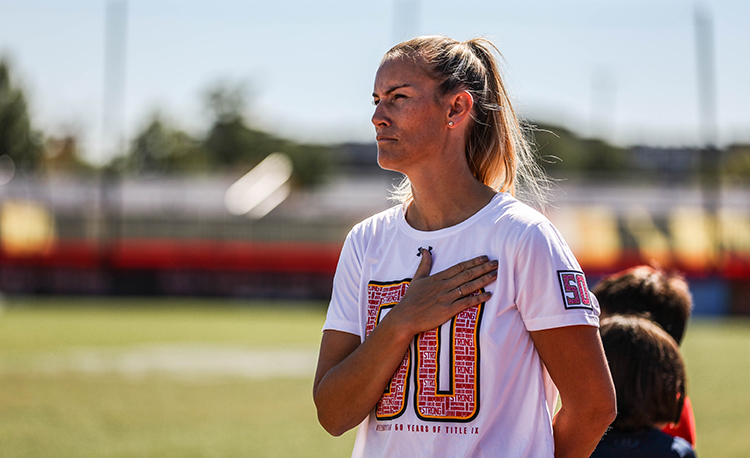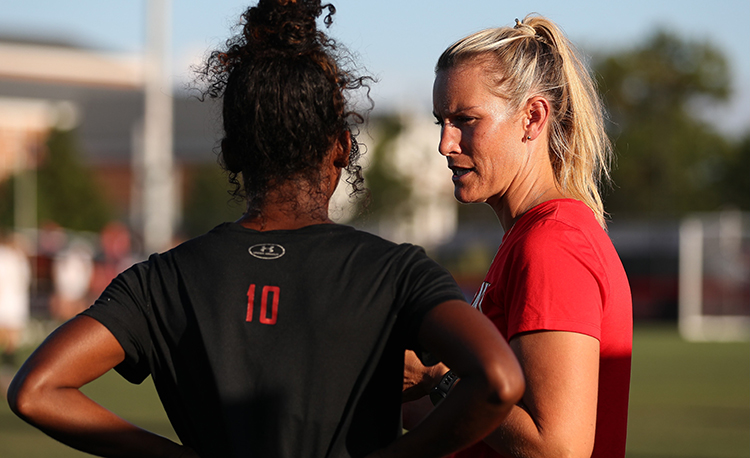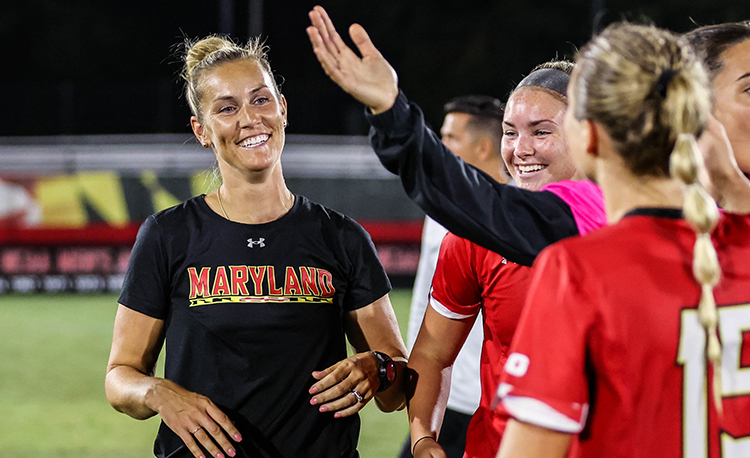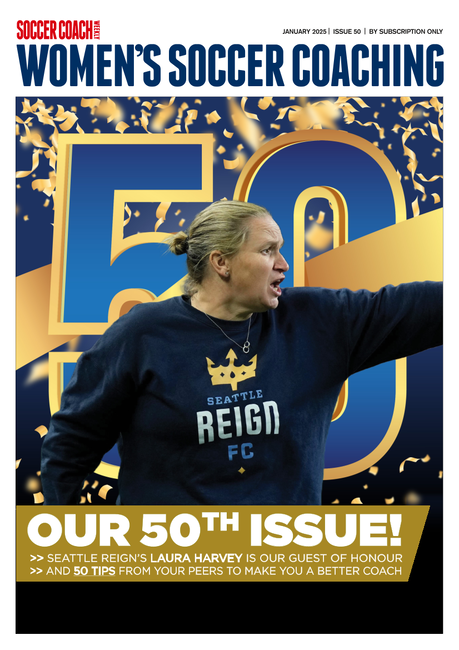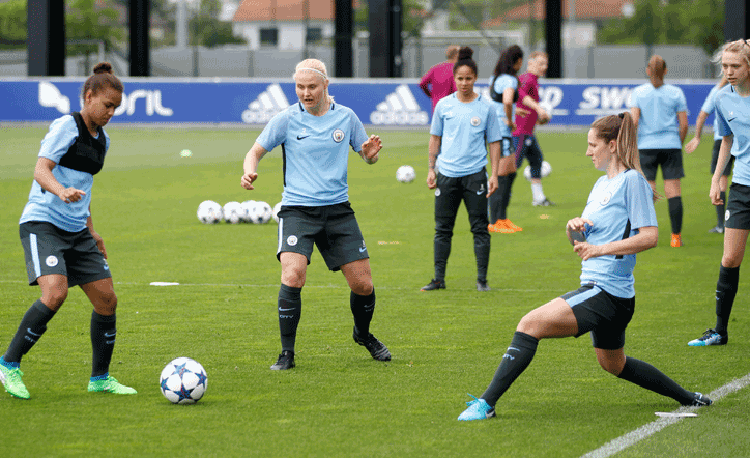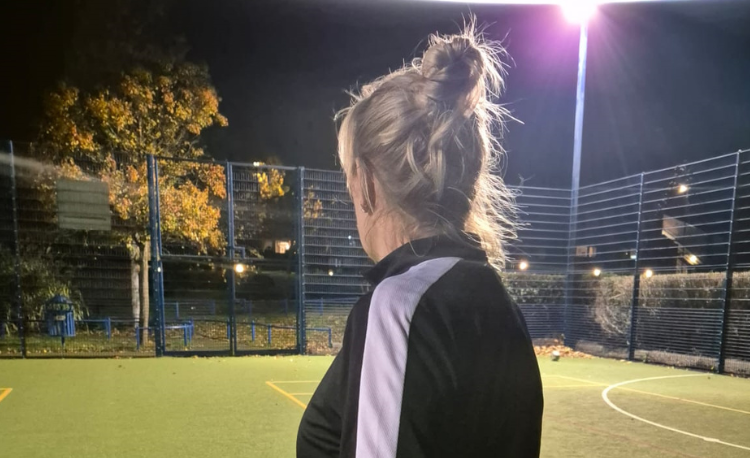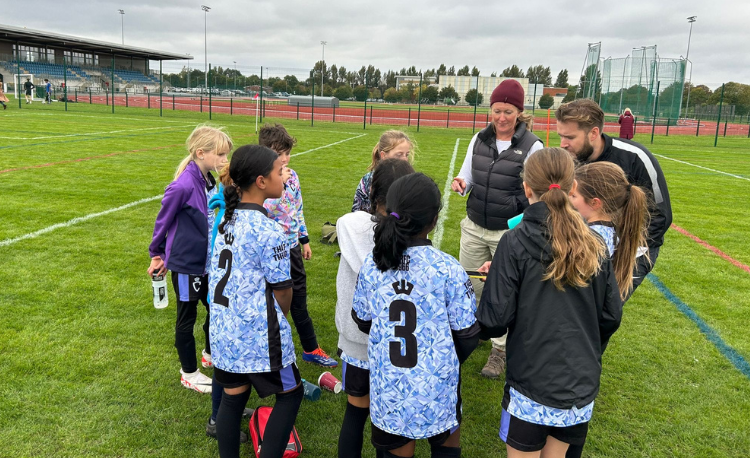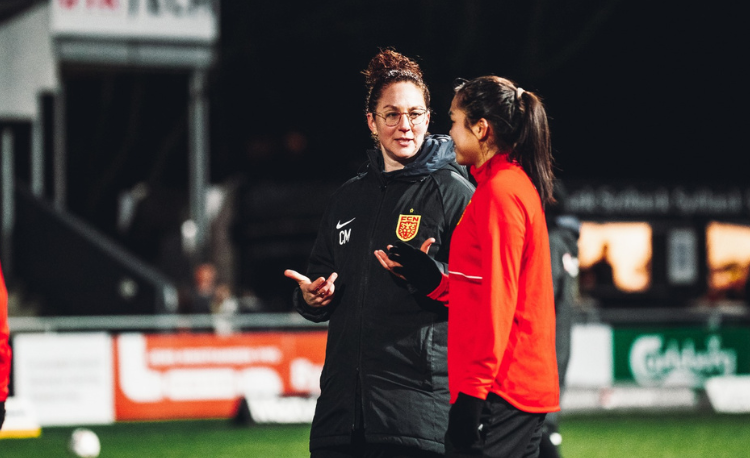You are viewing
1 of your 3 free articles
Meg Nemzer: Building a championship mindset
A star player and coach at Rutgers, Meg Ryan Nemzer is now making waves at her first love, the University of Maryland. But, she tells Steph Fairbairn, work is well under way to build a ‘championship mindset’...
In December 2021, Meg Ryan Nemzer took on her dream job – head women’s soccer coach at the University of Maryland.
For the Maryland native, getting offered the role was a ‘full circle’ moment.
“When I was nine years old, I really fell in love with the game,” Nemzer told Women’s Soccer Coaching. “And I actually started at the University of Maryland.
“I was a ball girl and I got to see these strong, female players on the field, demanding more from themselves, and from their teammates. Intense but passionate.
“I thought: ‘How cool is that? I want to be part of that’. To see them celebrate and dog pile after a win in overtime, that’s really where I fell in love with the game.
“Coming back to Maryland, that’s the goal - to celebrate and to really embrace that championship mindset culture.”
This culture is something that Nemzer references frequently – it is the foundation of everything she is building at Maryland. And it is something she has learned over the course of an impressive career in the game.
Nemzer attended Rutgers University in New Jersey, where she was co-captain for three consecutive seasons and a key pillar of what many called the best defense in the country.
In 2006, the team conceded just six goals and achieved 16 clean sheets – the most in Rutgers’ history.
“I got to see these strong, female players on the field - intense, but passionate...”
Nemzer went on to coach at Rutgers, spending 14 years there and working her way up from the bottom - through volunteer director of operations, second assistant, first assistant and recruiting coordinator, before spending the last eight seasons of her spell there as associate head coach.
In her last season at Rutgers, the team won the Big Ten Championship and achieved a final ranking of number three in the nation.
In 2015, Nemzer became the first female head coach to win an ECNL National Championship, in charge of the Arsenal Players Development Academy.
This path of success is one that Nemzer has forged for herself – and she has used every step along the way to prepare herself to excel in the head coach role.
Being a director of ops ingrained in her the details, habits and organization to run every element of a program day to day.
Being a recruiting coordinator allowed her to, she says, “own the recruiting process” and make mistakes in order to learn what works.
The coaching roles offered her the biggest development opportunity of all: finding out who she was as a coach in a world that hadn’t given her many examples to follow.
“As the first assistant, [it was] really getting that on-field coaching, developing my voice and trying to figure out: ‘What did Meg Nemzer sound like?’”, she said.
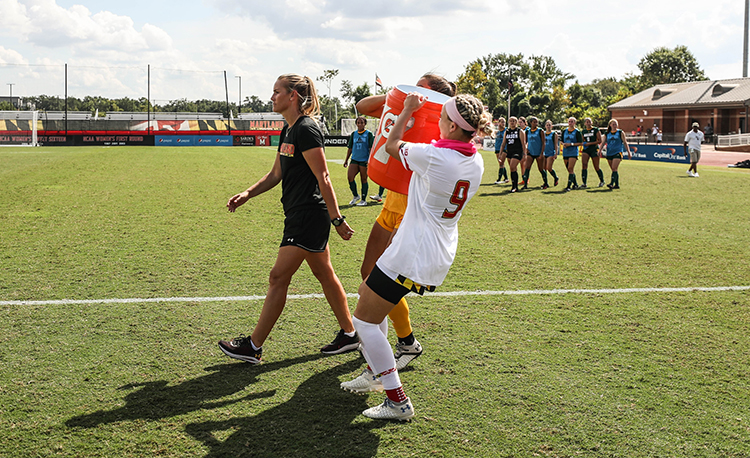
“I never had a female coach. I only had male coaches, so I couldn’t really try to mimic anything. I really had to find what worked for me, what connected my players to me.
“Then, on becoming an associate head coach, I was very fortunate where [then head coach] Mike O’Neill basically allowed me to almost be a co-head coach. I went to head coach’s meetings. Every decision that was made in that program, it was us.
“So I really learned the details that needed to happen on the day-to-day. And then I really got to learn my voice, what made me special as a coach and my coaching style.”
Having worked to understand what makes her special, supporting her players to identify what is special within themselves is a key part of what Nemzer does.
“Building relationships is something I enjoyed as a player, whether it was getting to know my team-mates or other recruits trying to be part of the program,” she said. “That has transitioned to being a coach as well.”
The relationship building starts in the recruiting process, something which Nemzer says is very important to her.
She explains her process more: “We spend a lot of time on the phone, [or on] Zoom calls, just to get to know them,” she said.
“In the first conversation I have with recruits, I actually try not to talk about soccer at all. I try to make them tell me a bit about them. What makes them special as a person?
“I think when you have that comfort level, it really does help to break down barriers, whether it’s on the field or off the field.”
And when they do commit, the work continues to get to know them, support them, and enable them to get a better understanding of the culture they are joining.
Nemzer continues to communicate with her future players through their high school and club seasons, finding, she says, “ways to continue to give them feedback, so they know we’ve invested in them and they need to invest in the program when they are here”.
When the players arrive, it’s more of the same. “The first day of pre-season, I have individual meetings with everyone and, once again, I don’t talk about soccer,” Nemzer explains.
“The fact we’ve invested in them is, to me, something I definitely want to make sure they understand - because if they know that I care about them as a person, I believe you can get more out of them on the field and can demand more.
“Sometimes people don’t understand that balance. You can be that stern voice that demands 10 out of 10, but let me put my arm around you and be like, ‘Look, you’ve got this. It’s because I believe in you and because I know that you can do it’.
“And once I see something once, that’s the expectation.”
Nemzer’s focus on culture is the basis of her championship mindset philosophy. A culture shift is something she knew she had to bring about as soon as she took on the role with the Terps, as Maryland are known.
“We always talk about the four pillars of the game [mental, tactical, technical, physical],” she says. “For those four pillars of the game, everything needed to be better. Everything needed to have more of a championship mindset.
Related Files
“It was good. But the history of the University of Maryland...you’ve had national team coaches, you’ve had championships won. I think that’s the biggest thing - how do we get that there?”
It started with her coaching staff. When she first came in, it was just Nemzer and Nemzer - Meg and her husband, Joe, who she says was incredibly supportive of the move to Maryland and ran the ship for a while as she put together her team.
Her assistant coaches are Katie Ely and Alex Ng.
Ely is a goalkeeper coach who came highly recommended. “I had a conversation with her, and from the first minute I knew she was the right one,” says Nemzer.
Ng is, according to Nemzer, someone that wants to learn and loves the game. He has the passion which Nemzer feels is the key to making a good coach.
Director of player development Kenie Wright is someone who Nemzer knows well.
“I have coached her since she was 13 years old. It was really important to me to bring in a player that I coached [and] to have a female on the staff. She played pro. I love her story.”
And finally, there’s Justine Stoner as the director of operations. Having worked together at club level, they get along well - not just as colleagues, but as people too.
“We laugh, we hang out with each other,” says Nemzer. “I think that’s really important for the team to see that as well.”
What’s also important to Nemzer is creating a sense of unity and consistency among her staff to give the best to the players. And that began with language.
“We have a vocab sheet so we’re giving the exact same message to players...”
“We spent a lot of time on the details like terminology,” Nemzer says. “We have a vocab sheet [with] what I use, so we’re all giving the exact same message to our players.
“Because if you’re saying one thing and I’m saying another thing, the players are not going to understand and then it’s just going to cause a delay in that growth.
“They are all very excited about building this program to the standard that it needs to be.
“So we were really intentional about what we were saying and we spent a lot of time together making sure we understood that.”
It seems to have worked. In the 2022 season, the Terps finished with three wins in NCAA Big Ten play, the most since 2019. The team recorded the first back-to-back away wins since it joined the conference in 2014.
These are big steps forward, all enabled by the culture shift.
Nemzer says one of her biggest lessons from her first season in charge was that “culture can’t be substituted with tactics or [the] technical [side].”
It is a drum she had to continue to beat throughout the season, and one she will continue to beat for what she hopes is a long time to come as head of the Terps.
“One thing I’ve learned in my history of coaching is that you think you have a good culture and then you don’t talk about it.
“You’re constantly trying to move the needle forward. So it might move back, but if you don’t talk about it, it’s going to continue to move back and move back.”
‘Defensively, we’re very detailed’ – Meg’s tactical identity“Defenses win championships. Defensively, we’re very disciplined, very detailed.
|
‘I HAVE A RULE WHERE I’M THERE WHEN SHE WAKES OR WHEN SHE GOES TO SLEEP’ – Meg on JUGGLING COACHING AND BEING A MOM“No matter what you do, you get mom guilt - especially with social media and seeing other moms spending more time with their child. Sometimes that’s difficult for me to see.
|
Newsletter Sign Up
Newsletter Sign Up
Discover the simple way to become a more effective, more successful soccer coach
In a recent survey 89% of subscribers said Women's Soccer Coaching makes them more confident, 91% said Women's Soccer Coaching makes them a more effective coach and 93% said Women's Soccer Coaching makes them more inspired.
*includes 3 coaching manuals
Get Inspired
All the latest techniques and approaches
Women's Soccer Coaching offers proven and easy to use soccer drills, coaching sessions, practice plans, small-sided games, warm-ups, training tips and advice.
We've been at the cutting edge of soccer coaching since we launched Soccer Coach Weekly in 2007, creating resources for the grassroots youth coach, following best practice from around the world and insights from the professional game.
